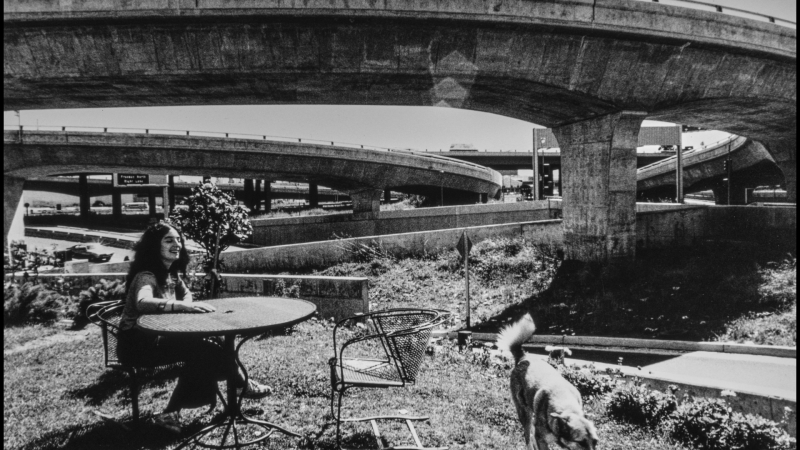Bonnie Ora Sherk began her career as a landscape painter, but then realized she wanted to be in the landscape herself. From the nucleus of that idea, her 1970 installation “Portable Park,” a popup farm complete with sod, trees, and farm animals situated under a San Francisco freeway overpass, was born. As she observed, “Freeways are beautiful, but they need to be softened. Why use them just for cars?” Sherk, who died in 2021, spent her career transforming “dead spaces” into lived experiences like gardens, farms, and trails, all meant to engage audiences by showing them the wonders of the overlooked world around them. Today she is considered the godmother of urban reinvention, gardens, and the parklet. We’ll talk about a new retrospective of her work with curators and artists who have been inspired by her.
Godmother of the Parklet, Artist Bonnie Ora Sherk Celebrated in Retrospective

View of American landscape planner Bonnie Ora Sherk (1945 - 2021) sits at an outdoor table at the Farm (also known as Crossroads Community), a community center she founded. (Janet Fries / Contributor via Getty Images)
Guests:
Tere Almaguer, environmental justice organizer, Poder - Almaguer works with Hummingbird Farms, a seven-acre urban farm in San Francisco
Frank Smigiel, director of arts programming and partnerships, Fort Mason Center for Arts & Culture; former curator, SF MOMA - Smigiel helped bring the Bonnie Ora Sherk retrospective to Fort Mason
Tanya Zimbardo, curator, "Bonnie Ora Sherk: Life Frames Since 1970"
John Bela, urbanist; artist - Bela has created a garden space in conjunction with the Bonnie Ora Sherk retrospective at Fort Mason. Bela is also a partner at Urban Field Studio, a Bay Area urban design collective
Rae Alexandra, staff writer, KQED Arts & Culture; creator and author, "Rebel Girls from Bay Area History" series
Sponsored